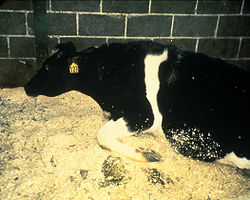*Image Credit: Wikimedia Commons Nearly a decade after the first reported case of a strange new disease affecting cattle in the United Kingdom (UK), the Veterinary Committee of the European Union banned British beef on March 25, 1996 amid fears about the spread of Mad Cow Disease. The severity of the condition and its subsequent transmission to humans put a damper on the cattle industry in Britain for more than a decade. Bovine spongiform encephalopathy (BSE), better known as Mad Cow Disease, is a peculiar affliction that affects the brain and spinal cord of infected animals. In basic terms, a misshapen protein — referred to by scientists as a “prion” — enters the nervous system of the animal in question, then glues itself to another protein and twists it into a different, non-working shape. The process continues over time, deforming more and more tissue until the brain becomes filled with tiny holes, resulting in loss of function and death. Though a disease with a similar presentation to BSE is known to have existed in cattle and sheep in ancient Greece and Rome, the modern strain first appeared in 1986. The cause of the disease is difficult to pinpoint, yet many researchers wonder if the differences in feeding procedures for European cattle as opposed to their counterparts on other continents may have played a role. Regardless, by late 1987, officials at the British Ministry of Agriculture were certain a deadly new disease existed. By the middle of the next year, the decision was made to slaughter infected cows immediately as a precaution. In the early days, administrators were sure of very little: apart from BSE’s effects, the mode of transmission was still somewhat of a mystery. Eventually, scientists determined bone material and offal — organs like the brain, thymus and tonsils — held the prions most efficiently. And, because cooking the tissues did nothing to affect the harmful proteins, British citizens were prevented from eating the organs beginning in 1989. The next year, the restriction was extended to the animals themselves. Fearing widespread contamination, the European Commission banned the export of cattle older than six months of age. In early 1996, the British government revealed the possibility BSE could make the leap to human tissues and, in fact, already affected 10 people. Known as variant Creutzfeldt-Jakob Disease (vCJD) in humans, the possibility of large populations wasting away due to the effects of the illness frightened many. Because of the long time frame between ingesting the prions and the appearance of symptoms, the Veterinary Committee of the European Union (EU) opted to ban all exports of British beef on March 25, 1996. The following morning, when the decision was made public, confusion reigned. On the one hand, the EU had designated the meat as unsafe. On the other, the British administration under Prime Minister John Major was assuring citizens nothing more needed to be done. News of the disease had already threatened the multi-billion-dollar industry all over the UK, creating a global panic among consumers that seemed likely to explode in the wake of the ban. The British were left with no option but to propose drastic steps to remove the disease from the population. Within days, officials offered to slaughter 40,000 cattle to help speed the transition to safer beef. (In the end, the number was doubled.) At one point, British Agriculture Minister Douglas Hogg put forward the idea it might be necessary to kill every cow more than 30 months old — a staggering 4.5 million animals. What resulted from the ban amounted to a stand-off between the British and the EU. For the next several years, the government lobbied hard to lift the embargo on cattle from the UK, successfully opening the door for beef from Northern Ireland to hit the market in 1999 due to innovative means of tracking herds in place. In addition, the EU agreed to allow deboned products from Britain to leave the country so long as heavy monitoring was in place. Despite the minor victories — and an announcement from scientists that British beef was again safe — the fight would continue as another confirmed case showed up months later in an animal born after safety measures were in place. Days after an official British Inquiry savaged officials for efforts to suppress the seriousness of BSE and the possibility of vCJD in October 2000, French farmers chose to stop selling meat from cattle born before the middle of 1996. Positive tests were growing — some in continental Europe and, within a year, as far away as Japan. As a result of the cattle scare, dairy and beef farmers all over the world were subjected to new tests and modernized regulations. Though cases of vCJD are exceedingly rare — less than one person for every million — some theorize the incubation period could be as long as 50 years, meaning the effects of the Mad Cow Disease outbreak through the late 1990s and early 2000s might not be seen for decades. Satisfied new precautions were in place to minimize instances of BSE even further through early detection and quick quarantines of infected animals, the EU Veterinary Commission voted unanimously to completely lift the ban on March 8, 2006. The lost decade had cost British beef farmers nearly a billion dollars in revenue. Also On This Day: 421 – According to legend, the city of Venice is founded in northeastern Italy 1306 – Robert the Bruce becomes the King of Scotland 1584 – Sir Walter Raleigh receives a patent to colonize Virginia 1807 – The Slave Trade Act abolishes the slave trade in the British Empire 1975 – Faisal of Saudi Arabia is assassinated
March 25 1996 – The Veterinary Committee of the European Union Bans the Export of British Beef
*Image Credit: Wikimedia Commons Nearly a decade after the first reported case of a strange new disease affecting cattle in the United Kingdom (UK), the Veterinary Committee of the European…
307
